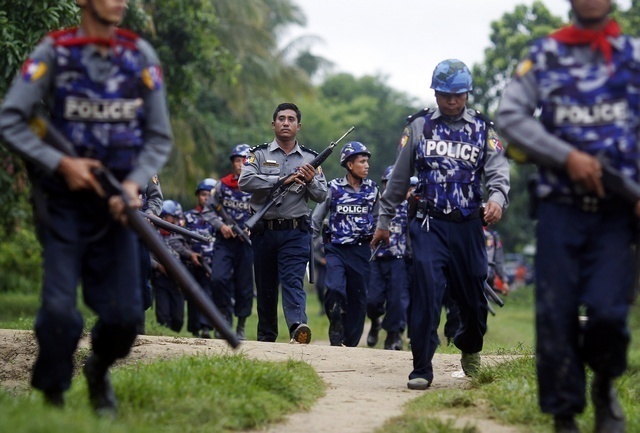A government-backed commission has recommended doubling armed troops in Arakan state to enforce security and segregation between Rohingya Muslims and Buddhists, after two bouts of ethno-religious violence last year.
In a highly anticipated report released on Monday, the commission blamed tensions between Buddhist Arakanese and Muslims on generations of “bitterness” and cultural “differences” and called for the introduction of “family planning” measures to regulate the rapid population growth of the Rohingya.
The commission urged officials to provide internally displaced persons (IDPs) with adequate shelter before the onset of the monsoon season, but argued that the two communities must remain segregated until “overt emotions subside”.
“While the report recognises the critical need to ensure adequate humanitarian support and shelter for displaced Rohingya before the monsoon sets in, it fails to address the need for accountability for ethnic cleansing and crimes against humanity that happened in last June and October,” said Phil Robertson from Human Rights Watch (HRW).
“By failing to hold responsible the individuals who committed these grievous crimes, the government will miss deterring precisely those extremists who are prepared to use more violence in the future to achieve their aims.”
According to the government commission, the sectarian conflicts led to “192 deaths, 265 injuries, and the destruction of 8,614 houses, turning an estimated 100,000 into internally displaced people”.
However, according to HRW’s independent investigations more than 200 people were killed, which Robertson says is likely an underestimation.
“In reality, both figures are likely serious underestimates of the numbers killed, so it’s critical the government conduct a serious investigation to account for the missing and identify those buried in mass graves so that the truth can finally be known,” said Robertson.
The government-appointed commission notably refused to call the stateless Rohingya by name and rather referred to the ethnic group as “Bengalis” throughout the report.
The commission’s findings also made no mention of revising the controversial 1982 citizenship law passed under Ne Win’s rule that rendered the group stateless.
“The recommendation for citizenship to be reviewed in line with the 1982 citizenship law and international laws is incompatible, as the 1982 citizenship law violates international norms and Burma’s treaty obligations,” Burma Campaign UK’s director Mark Farmaner told DVB.
The report calls for greater investment in civic institutions and infrastructure in the western state, along with a boost in security forces.
“The Government should double the strength of the Tatmadaw, the police force, intelligence personnel, and Border Security Force (Na-Sa-Ka) personnel assigned to Rakhine State to control and prevent further violence in Rakhine State,” read the report.
But human rights activists say an influx of armed troops could have disastrous consequences for the local population.
“Everyone knows that the NaSaKa is a serial rights abusing force that ranks up with the worst that Burma has to offer – so why would anyone want to give them more power, resources, and troops without first changing their behavior?” said Robertson.
According to the commission, tensions have been fuelled by an expanding population of Rohingya Muslims in Arakan state and called for “voluntary” family planning programmes to regulate their growth.
“If, as proposed, family-planning education is provided to the Bengali (Rohingya) population, the Government should refrain from implementing non-voluntary measures which may be seen as discriminatory or that would be inconsistent with human rights standards,” read the report.
Commission member and famed former student leader Ko Ko Gyi defended the group’s findings in an interview with DVB on Monday, insisting they had fulfilled their “responsibilities”.
“We did the best at our capacity finding facts through interviews, field trips, and collecting information from historical documents and libraries – and recommending measures to prevent further riots, to bring about social harmony, to reduce sentiments and fears by our ethnic nationality citizens which is a very sensitive issue, and to reduce the level mistrust between the two communities which will take time.”
The 27-member commission was established by presidential decree last August to investigate Burma’s worst sectarian clashes in decades, which displaced more than 120,000 people and left hundreds dead. It has been heavily criticised for excluding members of the Rohingya community, but including well-known Arakanese nationalists.
The commission was initially due to publish its report in September 2012, but its release has been repeatedly delayed after renewed outbreaks of ethno-religious clashes in Burma.
-Than Win Htut provided additional reporting.



